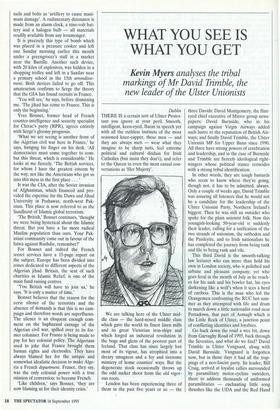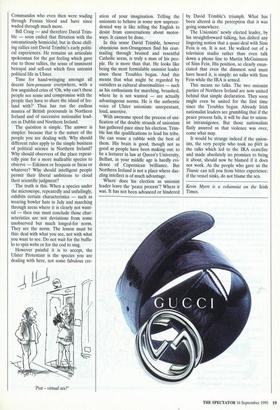WHAT YOU SEE IS WHAT YOU GET
Kevin Myers analyses the tribal
markings of Mr David Trimble, the new leader of the Ulster Unionists
Dublin THERE IS a certain sort of Ulster Protes- tant you ignore at your peril. Smooth, intelligent, keen-eyed, fluent in speech yet with all the ruthless instincts of the most seasoned knee-capper, these men — and they are always men — wear what they imagine to be sharp suits, feel extreme political and cultural disdain for Irish Catholics (but insist they don't), and refer to the Queen in even the most casual con- versations as 'Her Majesty'.
We are talking here of the Ulster mid- dle class — the hard-nosed middle class which gave the world its finest linen mills and its great Victorian iron-ships and which forged an industrial revolution in the bogs and glens of the poorest part of Ireland. That class has since largely lost most of its vigour, has atrophied into a dreary smugness and a fey and tiresome mimicry of home counties' ways. But the degenerate stock occasionally throws up the odd sucker shoot from the old vigor- ous roots.
London has been experiencing three of them in the past five years or so — the three Davids: David Montgomery, the flint- eyed chief executive of Mirror group news- papers; David Burnside, who in his campaign against Virgin Airways added such lustre to the reputation of British Air- ways; and finally David Trimble, the Ulster Unionist MP for Upper Bann since 1990. All three have strong powers of cerebration and leadership, and in the case of Burnside and Trimble are fiercely ideological right- wingers whose political stance coincides with a strong tribal identification.
In other words, they are tough bastards who seem to know where they're going, though not, it has to be admitted, always. Only a couple of weeks ago, David Trimble was assuring all listeners that he would not be a candidate for the leadership of the Ulster Unionist Party, Northern Ireland's biggest. Then he was still an outsider who spoke for the plain unionist folk. Now this youngish-looking 50-year-old is suddenly their leader, calling for a unification of the two strands of unionism, the orthodox and the Paisleyite, and to Irish nationalists he has completed the journey from being rank and file to being rank and vile.
This third David is the smooth-talking law lecturer who can more than hold his own in London society, who is polished and urbane and pleasant company; yet who goes feral in the month of July as he reach- es for his sash and his bowler hat, his eyes darkening like a wolf's when it sees a herd of caribou. This is the man who led the Orangemen confronting the RUC last sum- mer as they attempted with fife and drum to march down a little nationalist road near Portadown, that part of Armagh which is the Little Rock of Ulster, a junction point of conflicting identities and loyalties.
Go back down the road a wee bit, down from Garvaghy Road of 1995, back through the Seventies, and what do we find? David Trimble in Ulster Vanguard, along with David Burnside. Vanguard is forgotten now, but in those days it had all the trap- pings of a neo-fascist party. Its leader, Bill Craig, arrived at loyalist rallies surrounded by paramilitary motor-cyclists outriders, there to address thousands of uniformed paramilitaries — enchanting little song thrushes like the UDA and the Red Hand Commandos who even then were wading through Fenian blood and have since waded through much more.
Bill Craig — and therefore David Trim- ble — soon ended that flirtation with the ostentatiously homicidal; but in those chill- ing rallies rest David Trimble's early politi- cal experiences. He remains an articulate spokesman for the gut feeling which gave rise to those rallies, the sense of imminent betrayal and sell-out which fires unionist political life in Ulster.
Time for hand-wringing amongst all decent bien-pensants everywhere, with a few anguished cries of 'Oh, why can't these people see sense and compromise with the people they have to share the island of Ire- land with?' Thus has run the endless mantra of British proconsuls in Northern Ireland and of successive nationalist lead- ers in Dublin and Northern Ireland.
The question is simple. The answer is simpler: because that is the nature of the people you are dealing with. Why should different rules apply to the simple business of political science in Northern Ireland? Why should observers of the place repeat- edly pine for a more malleable species to observe — Eskimos or Iroquois or Incas or whatever? Why should intelligent people permit their liberal ambitions to cloud their scientific judgment?
The truth is this. When a species under the microscope, repeatedly and unfailingly, exhibits certain characteristics — such as wearing bowler hats in July and marching through areas where it is clearly not want- ed — then one must conclude those char- acteristics are not deviations from some unobserved but much longed-for norm. They are the norm. The lesson must be this: deal with what you see, not with what you want to see. Do not wait for the buffa- lo to spin webs or for the cod to sing.
However painful it is to accept, the Ulster Protestant is the species you are dealing with here, not some fabulous cre- Psst – virtual sex?' ation of your imagination. Telling the unionists to behave in some new unprece- dented way is like telling the English to desist from conversations about motor- ways. It cannot be done.
In this sense David Trimble, however obnoxious non-Orangemen find his coat- trailing through bruised and resentful Catholic areas, is truly a man of his peo- ple. He is more than that. He looks like being the most formidable unionist leader since these Troubles began. And this means that what might be regarded by outsiders as cultural abnormalities — such as his enthusiasm for marching, besashed, where he is not wanted — are actually advantageous norms. He is the authentic voice of Ulster unionism: unrepentant, loud, assertive.
With awesome speed the process of uni- fication of the double strands of unionism has gathered pace since his election. Trim- ble has the qualifications to lead his tribe. He can rouse a rabble with the best of them. His brain is good, though not as good as people have been making out: to be a lecturer in law at Queen's University, Belfast, in your middle age is hardly evi- dence of Copernican brilliance. But Northern Ireland is not a place where daz- zling intellect is of much advantage.
Where does his election as unionist leader leave the 'peace process'? Where it was. It has not been advanced or hindered by David Trimble's triumph. What has been altered is the perception that it was going somewhere.
The Unionists' newly elected leader, by his straightforward talking, has dished any lingering notion that a quasi-deal with Sinn Fein is on. It is not. He walked out of a television studio rather than even talk down a phone line to Martin McGuinness of Sinn Fein. His position, so clearly enun- ciated that even the dimmest soul must have heard it, is simply: no talks with Sinn Fein while the IRA is armed.
This means no talks. The two unionist parties of Northern Ireland are now united behind that simple declaration. They soon might even be united for the first time since the Troubles began. Already Irish nationalist leaders are grumbling that if the peace process fails, it will be due to union- ist intransigence. But those nationalists flatly assured us that violence was over, come what may.
It would be strange indeed if the union- ists, the very people who took no part in the talks which led to the IRA ceasefire and made absolutely no promises to bring it about, should now be blamed if it does not work. As the people who gave us the Titanic can tell you from bitter experience: if the vessel sinks, do not blame the sea.
Kevin Myers is a columnist on the Irish Times.



































































 Previous page
Previous page